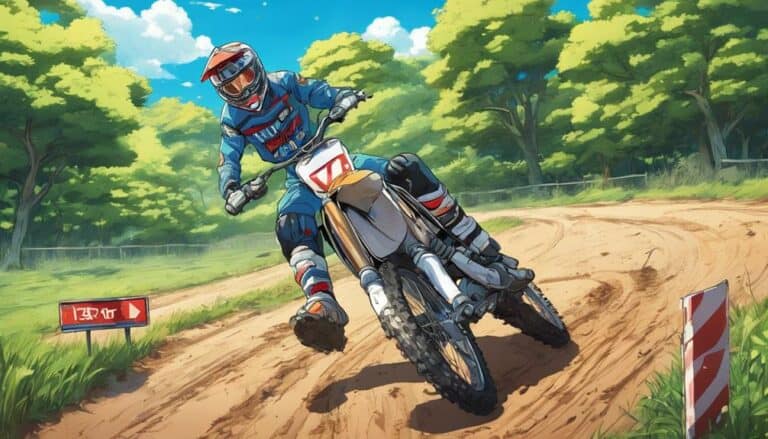So, you've pondered the idea of cruising down the road on your trusty dirt bike, reveling in the freedom of the open streets. However, before you rev that engine and hit the pavement, there's an important detail you may have overlooked.
The regulations governing the use of dirt bikes on public roads are not just arbitrary rules; they serve a significant purpose in ensuring the safety of both riders and other road users. But what exactly are these reasons that prevent your off-road adventures from smoothly moving to the asphalt jungle?
Let's unravel the mystery behind why riding on the road on your dirt bike isn't as simple as it seems.
Key Takeaways
- Dirt bikes lack essential road safety components, making them unsafe for road use.
- Street-legal dirt bikes require specific equipment and modifications to comply with regulations.
- State laws and regulations vary for riding dirt bikes on public roads.
- Legal consequences like fines and vehicle impoundment result from riding non-compliant dirt bikes on roads.
Legal Restrictions on Dirt Bikes
When considering the legality of riding dirt bikes on the road, it's essential to understand the legal restrictions that govern their use. Dirt bikes, designed for off-road terrain, lack the necessary components to meet road safety standards, rendering them illegal for street riding in many states.
While stock dirt bikes aren't permitted on city streets or neighborhoods, dual-sport bikes offer a potential solution. These bikes can be converted for road use by adding specific features to comply with road regulations. However, to ride a dual-sport bike legally on the road, a motorcycle license is typically required.
In contrast, riding a registered dirt bike with a plate is legal on the road, but certain modifications and registration are necessary to meet legal requirements. It's crucial to check with local authorities to understand the specific laws and regulations governing the use of dirt bikes on public roads to guarantee compliance and avoid any legal issues.
Street-Legal Dirt Bike Requirements
To verify the legality of riding dirt bikes on public roads, specific modifications such as headlights, taillights, turn signals, mirrors, and a horn are required for street-legal dirt bikes. Additionally, certain street-legal dirt bikes may need a stator and battery, especially competition models, to power these essential components. Obtaining a motorcycle license is necessary to ride a street-legal dirt bike, mirroring the process of acquiring a standard driver's license. State regulations vary concerning the conversion process and determining which dirt bikes are eligible for road use. Before converting a dirt bike for street riding, it is crucial to research local rules meticulously and confirm legal and safe riding areas. Ensuring compliance with these requirements not only enhances your safety but also prevents legal issues that may arise from riding a non-street-legal dirt bike on public roads.
| Street-Legal Dirt Bike Requirements |
|---|
| Headlights |
| Taillights |
| Turn Signals |
| Mirrors |
| Horn |
State-Specific Dirt Bike Laws
State-specific dirt bike laws dictate the regulations and requirements for riding dirt bikes on public roads, with variations depending on state legislation and local ordinances. Before hitting the road, it's essential to understand the dirt bike laws in your state.
License requirements, equipment regulations, and permitted modifications for street-legal dirt bikes are all governed by state legislation. To guarantee compliance with the laws, always check with the Department of Motor Vehicles for updated information on dirt bike regulations.
Additionally, be aware that each state may have additional local laws that impact dirt bike usage on public roads. It's critical to research and understand these laws before modifying your dirt bike for street use.
Reasons for Prohibiting Dirt Bikes on Roads
Dirt bikes are typically prohibited on roads due to safety concerns arising from their lack of essential road components and off-road-oriented design features. Here are some reasons why riding dirt bikes on roads is restricted:
- Safety Hazards: Dirt bikes lack headlights, taillights, and turn signals, making them less visible to other road users and increasing the risk of accidents.
- Non-Compliance: Stock dirt bikes don't meet road requirements such as emission standards and noise regulations, leading to environmental and noise pollution concerns.
- Legal Consequences: Most states have laws prohibiting dirt bikes on roads to guarantee traffic safety and compliance with vehicle regulations. Riding dirt bikes on roads without proper legalization can result in fines, citations, or even vehicle impoundment.
To maintain traffic safety and uphold vehicle regulations, it's essential to respect these laws and avoid riding dirt bikes on public roads.
Tips for Riding Dirt Bikes Legally
For legal dirt bike riding on public roads, make sure your bike meets all necessary road equipment requirements. To ride a street-legal dirt bike, you may need to make the conversion from an off-road only to dual-purpose bike. The requirements for your bike may vary from state to state, so research the specific regulations in your area. In general, to ride a dual sport on the road, you will need a motorcycle license. Riding a street-legal bike guarantees you avoid noise violations and pollution issues that often come with illegal off-road riding. Additionally, make sure your bike has the necessary DNR/registration sticker to prove its legality. Below is a table summarizing key points to consider when aiming to ride your dirt bike legally on public roads:
| Tips for Riding Dirt Bikes Legally |
|---|
| Convert to a street-legal bike |
| Check state-specific requirements |
| Obtain a motorcycle license |
| Avoid noise violations and pollution |
| Confirm DNR/registration sticker is up to date |
Conclusion
So, now you know why riding dirt bikes on the road is a big no-no. Remember, safety and legality go hand in hand when it comes to enjoying your off-road adventures.
Stick to designated trails and off-road areas to avoid any legal trouble and keep yourself and others safe.
Happy riding, just not on the road!

